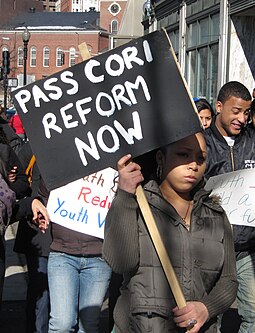Criminal Offender Record Information
[2] On August 6, 2010, Governor Deval Patrick signed into law reforms to the state's criminal offender records information system (CORI), aiming to “to improve employment opportunities”.
[3] CORI has been controversial because information that a person has committed or been accused of committing a crime makes it difficult to obtain housing, employment, loans, insurance, entrance to college, or become a guardian or foster parent.
CORIs display all court arraignments—regardless of the eventual outcome of the case—and advocates say this in effect turns all criminal histories into "life sentences".
[2] They also point out that the social and economic impact of CORI affects the children of former offenders.
However individuals must wait an additional 15/10 years if they receive even a minor citation, such as a traffic ticket for more than $50.
